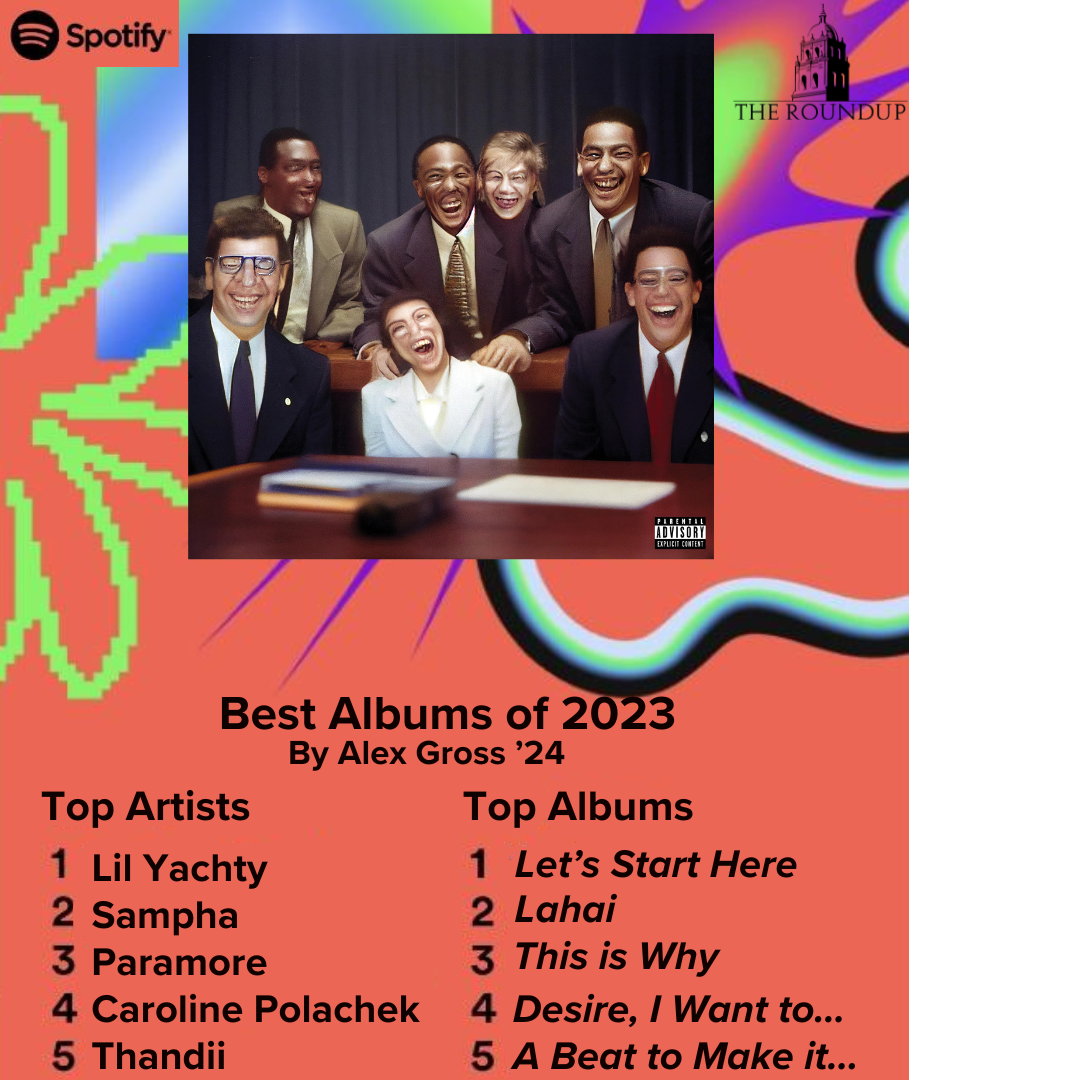Photo by Raymond Link ’20 | A group of students engage in a friendly micro competition through the use of “Kahoot!”.
By Juan Sanchez ’20
THE ROUNDUP
While some teachers such as Mr. John Damaso and Ms. Breanne Toshner utilize macro competitions in their respective classrooms to promote engagement of the course material, Mr. Seamus Walsh is generally against classroom competitions if done incorrectly.
Mr. Walsh, Assistant Principal for Academic Affairs, describes classroom competitions in two ways: in the micro and in the macro sense.
Micro competitions are small formative activities where groups of students are doing Kahoots or in a similar sense of teams. Macro competitions focus more on which student can obtain the highest score on an essay or in the class according to Mr. Walsh.
Kahoot is a game-based-learning platform where students may take multiple choice quizzes, reinforcing what they are currently learning.
“I think anything on the micro level, anything that adds some energy to classroom activities are a good thing,” Mr. Walsh said. “When I have watched [kids playing Kahoot], that more kids are paying attention, more kids are engaged, kids have fun. It’s what they call the gamification of learning.”
“In a macro classroom context, I think you really should be competing with the material and yourself,” Mr. Walsh said. “I hope no teacher uses a leaderboard.”
However, Mr. Walsh also said that “Competition between or among friends I think is fine if everyone’s on the same page, such as a competition for the higher grade in a class or the higher GPA. If it’s done in the right spirit, that is.”
Ms. Toshner, mathematics teacher of AP Calculus and Honors Precalculus, has a leaderboard and believes that it motivates all students, changing the focus from an “A” in the class to being the best in the class.
“I think its effective for some students. I don’t think it’s effective for all students,” Ms. Toshner said.
In Ms. Toshner’s AP Calculus classes, especially throughout second semester, “we won’t look at top scores, we’ll look at most improved,” Ms. Toshner said.
“In Calculs what we have is a like a March Madness brackets for when they’re preparing for their AP tests,” Ms. Toshner said.
“The tests are taken individualally, but the scores are partner scores,” Ms. Toshner said. Meaning that students will be encouraged to help one another to obtain a better score.
If a student is uncomfortable with sharing their score with the classes, they are able to speak with Ms. Toshner and she will then remove it.
Ari Meta ’20, a student of Ms. Toshner’s pre-calculus class was first place on one of the leaderboards. He agrees with Ms. Toshner, believing that macro competitions are motivated but also believes that a student’s score should be private information. It is only when the student agrees to have his name on the leaderboard that it is okay.
According to Mr. Walsh, grades should not be tethered to competitions as that will inevitably lead to students hellbent on beating each other, making a once “right spirited” competition now riddled with aggressiveness.
“I don’t mind a teacher highlighting the best one or two or three pieces of student work, like in a Science Fair project, but a complete or even partial leaderboard of student scores in a classroom can be more demoralizing to students who struggle than motivating to them,” Mr. Walsh said.
Mr. Damaso, English Department Chair, utilizes competitions in the classroom through the use of a Membean competition and by the use of an Albert competition.
Membean is an interactive motimodal vocabulary instructor and Albert is a tool students can use to gain a personalized learning experience in core academic areas.
“I think what students often are confused by in competitions is how low stakes it actually is. It’s so tiny or trivial,” Mr. Damaso said.
Given the triviality, Mr. Damaso questions the necessity of a system to reencourage those students who have been demoralized.
“At some point, you’re not the best,” Mr. Damaso said. “My desk is not the cleanest. I don’t think I need a system in place to make me feel okay that my desk is not the cleanest.”
Mr. Damaso then goes on to say, “I think anything can become [a classroom competition] depending on the class culture.” This includes small formative activities such as Kahoots, Quizizzes, and Quizlet live’s.
Mr. Walsh states that “[competitions in the micro sense are] negative if there was a spirit of negativity toward those students or teams who don’t win or finish well, and if students and/or teams who struggle are publicly highlighted or demeaned.”
Ms. Rosalinda Freeman, an honors Spanish teacher, believes in the benefits of micro competitions, and the need to regulate the class culture to make sure no one is demoralized.
If a competition is too competitive, the stress level can perhaps become unbearable. In accordance with pedagogy, if a small amount of stress is added to a situation, students learn well, but if too much is added, then the entire learning process shuts down according to Ms. Freeman.
In fact, Ms. Freeman feels that by being in a foreign language class already adds another stress.
Allan George ’20, a student of Ms. Freeman and Ms. Toshner, believes that macro competitions are more motivational, but speculates that some students may be demoralized.
“I feel that more students are incentivized to do better [in macro competitions], but [for] those small percentages of students that are demoralized, there should be some sort of way to get them [modivated] again and [make them] see that they’re doing good,” George said.
While it is a general belief, of those interviewed, that competitions can have some value in the classroom if done so properly, others may disagree.
To these people who feel as if a specific classroom competition is demeaning to a student, then they are encouraged to make a complaint to Mr. Walsh, so that a policy may be made addressing said issue.
According to Mr. Walsh, such resolution could be “students’ assessment scores are their own, and teachers are not to share them with anyone else who doesn’t have a right to them.”




























